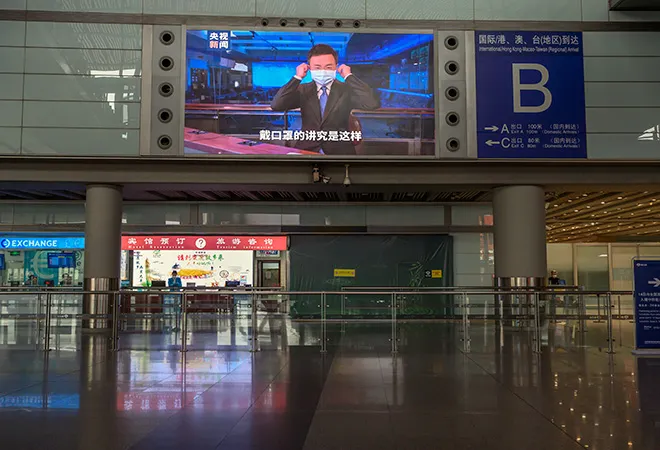
A human being’s willingness to commit the most evil act on another human being, is not replicated by any other species that exists today. Recent history is full of examples starting from Hitler’s Holocaust, Stalin’s Gulags to Mao’s and Xi Jinping’s correctional camps right down to the vicious killings and tortures by the Islamic State (ISIS) in the Middle East. During all this we had ‘Project MK-Ultra’, where Americans experimented with mind control or used Agent Orange to defoliate a country such as Cambodia.
Biological warfare has featured in history from the time of Barbarossa who poisoned water wells in Italy with human bodies in the 12th century to Anthrax in the first and second world wars and other toxins in the latter. So, was the Wuhan Virus just another chapter in this list of horrendous experiments to discover more efficient ways of eliminating the enemy or was it some noble experiment that went wrong? There have been many theories flung around on the origins of the Wuhan virus, from an Israeli researcher being quoted by The Washington Times all the way back in January that the virus was possibly made at the Wuhan Institute of Virology in Hubei, China, to scientists and academics having a free debate on the possibility of a leak, but also in agreement that it was not a bioweapon. Leaks, of course, have happened before. After the last known naturally occurring case of smallpox in 1977, before the disease was eradicated, British medical photographer Janet Parker contracted smallpox and died after lab grown smallpox leaked at the University of Birmingham Medical School.
When the Wuhan Virus first made serious headlines, the Indian government moved in quickly with the Indo-Tibetan Border Police (ITBP) establishing a 600-bed hospital outside Delhi while the Armed Forces Medical Centre began to manage an emergency medical centre in Haryana. Entry of foreigners was suspended, land borders sealed and later all flights stopped. Stranded Indians were retrieved by other Indians, including those in Wuhan and other parts of China, and from Iran and Italy as well. Many of those who themselves have access to the best medical facilities that money can buy in India and abroad have sniggered at the state of medical health facilities in the country. This situation did not come about in the last few years. If at all, it has improved for the common Indian through the Ayushman Bharat national health protection scheme, but no-one disputes that we have a long way to go. The advent of Covid19, or Wuhan virus, made India adopt a premptive approach as much as possible thanks to the commendable selfless contribution from Indian doctors and the larger Indian medical and health community. For India, given our resources, limiting the damage will be a victory.
Barring inanities and dangerously irresponsible acts by some privileged sections who presume immortality, highlighted by the strange behaviour of political scions, the common response has so far been commendable. Other countries have banned religious congregations, including in Mecca and the Vatican; Ram Navami celebrations will not take place in India and the Tablighi Jamaat gathering in Malaysia has been postponed. Schools, colleges and universities are shut globally. Amidst this global crisis, the most crucial period for all Indians has just begun.
It is true that Indian medical arrangements are inadequate despite many state-of-the-art facilities. Even so, population pressure is immense not just in numbers but also in density. Inevitably, there are some snide comparisons to what Prime Minister Modi said in his speech in comparison to what the Canadian Prime Minister Justin Trudeau said in his in Canada. This is partly because, in some sections, anything Modi does is wrong, bad or worse. And partly because anything a westerner does or says must be correct. Canada is a country of 37 million people, while India has 1.3 billion. The Canadian GDP per capita is $46,213, ours is $2,044 and Canadians live in a land that is three times larger than ours. They have just one friendly neighbour who protects them, we have two unfriendly ones equipped with nuclear weapons and one of them also sponsors jihadist terror against us every now and then. We are forced to spend money in huge amounts defending ourselves and commit our limited resources – material and human for this. Trudeau talked about money; Modi talked about humanity. Both, address starkly different priorities.
Each country will have to tackle this situation according to the collective resources it has. What Narendra Modi achieved in his address to the nation on 22 March, was an exhibition of what we can accomplish, if we put our hearts to it. The twenty-nine minute speech will not cure us of the pandemic, but drive home the point that collectively it can be done. What we must avoid is to air alarmist interviews by people who are not experts in the field. Panic is the last thing that we want.
We still do not know when, where and how this horror will end. There is one thing however that the rest of the world must ensure that there is international accountability for this criminal act. If the world lets the pandemic linger, if we let this kind of activity happen long enough or frequently enough, society collectively will accept it as the new normal. As it is, it appears that this man-made disaster is also nature’s revenge for all the ravages inflicted by mankind on mother Earth. Can we afford this and hope to survive? No, we will not unless we step back, pause and seriously look at the way we live and make some changes.
Now is not the time to play politics; now is the time to hunker down, show resilience and fight this battle.
The views expressed above belong to the author(s). ORF research and analyses now available on Telegram! Click here to access our curated content — blogs, longforms and interviews.




 PREV
PREV


